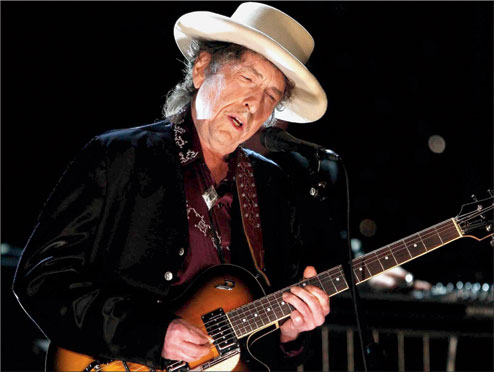
He had it comin' - the first words that came to my mind when one of my former students broke the breakin' news to me this afternoon.

Every year when I taught Dylan to first-year undergrads in Jadavpur University, I used to mention without fail that he gets nominated regularly for the Nobel, that sooner or later he's gonna win it. I believe a whole lotta my generation of senior citizens is dancing beneath the diamond sky this evenin', for we've lived to see the day that the Nobel Committee saw fit to honour not just Mr D, but also him as spokesman for the entire army of rock lyricists who revolutionised music a half-century ago, and not just that, for the entire youth movement mobilised by them to cause the times to change in political and social attitudes during the 1960s, impacting the whole world ever since.
In our present times, when wanton acts of violence destroy civilisation randomly without any warning or predictability, we cannot forget " how many times must the cannonballs fly/Before they're forever banned? ... how many deaths will it take till he knows/That too many people have died?"
Dylan and his contemporaries wore their anti-war sentiments on their sleeves, and marched as activists for peace. That is why I find the Nobel citation rather staid: only "for having created new poetic expressions"? Gimme a break - he did much more. He gave frustrated youth a voice; he radicalised students to protest against wrongs, to become peaceniks, to reject materialism: " Once upon a time you dressed so fine/You threw the bums a dime in your prime, didn't you?" How many in globalised India heed those words today?
India ... with whom Dylan had a very slender, but revealing link. In the Woodstock home of his late manager Albert Grossman and Albert's wife Sally (whose love for Baul songs led her to start Baularchive.com), he met Purna Das Baul, whom he put on the cover of John Wesley Harding and befriended for life. Without knowing Bengali, Dylan intuited that they sang the same language, of harmony and humanism. The Bauls will of course win no Nobel, but they inspired another Nobel-laureate poet: Tagore.
Process of association - who also composed songs, which the Nobel Committee didn't know then, which constituted the Gitanjali that they awarded the 1913 Prize to him for. His deeply spiritual songs connect laterally to that other devout Nobel recipient from Calcutta: Saint Teresa. Not a writer, but working indefatigably for peace and humanity. All of them.
Even Dylan went through a spiritual phase, though by common consensus it didn't produce great music. At the same time, we must not get bogged down only in the Sixties as his prime achievement. I acquaint my students with the three peak periods of his chameleonic career, each equally brilliant, all distinctly different. For the uninitiated, here goes my Critic's Choice of essential Dylan albums (the true rock connoisseur doesn't listen to individual MP3s but to that complete artwork known as an album):
The mid-60s: The Freewheelin' Bob Dylan (1963) and The Times They Are A-Changin' (1964), where his political conscience was upfront; Another Side of Bob Dylan (1964), on which he began to grow introspective; Bringing It All Back Home (1965), transitioning away from protest folk; Highway 61 Revisited (1965), on which he plays what he always wanted to, rock'n'roll; and the magisterial Blonde on Blonde (1966), one of the pioneering double-LPs in rock.
The mid-70s: His rollicking, virtually spontaneous, recordings with The Band, released much later as The Basement Tapes (1975), and the trilogy of Blood on the Tracks (1975), Desire (1976) and Street-Legal (1978), traversing love in all its agonising moods and variety, as well as a return to powerful political statements.
A brief brilliant interlude in 1985 with what I regard as another masterpiece, Empire Burlesque.
The millennium Dylan: After most everyone had written him off, a comeback of dark poetry against sparse backing, on the three consecutive albums Time out of Mind (1997), Love and Theft (2001) and Modern Times (2006). Then again, earlier this decade, Tempest (2012). He is so not happy with the state of the world on these bleak CDs. He, and we, all thought the times had changed, but they didn't. Notice how many times the word "time" recurs here!
How many rockers can boast of 15, count them (and I'm not naming all the others), classic albums spanning 55 years in the industry? Though they too changed the music, the Beatles and Jimi Hendrix unfortunately did not outlast a decade. Among the oldest, only the Rolling Stones and Paul Simon still rock, but even their diehard fans would agree that their creative output has been comparatively uneven. Indeed, how many authors have produced 15 consistently excellent books in their lifetimes? Dylan deserved the Nobel.
And consider his influence - from converting John Lennon to the cause of poetic lyrics to the political writing of U2 or Bruce Springsteen, down to the angry hip-hop of D'Angelo and Kendrick Lamar or all his songwriting disciples in far-off India, especially Calcutta, whether in English or Bengali.










